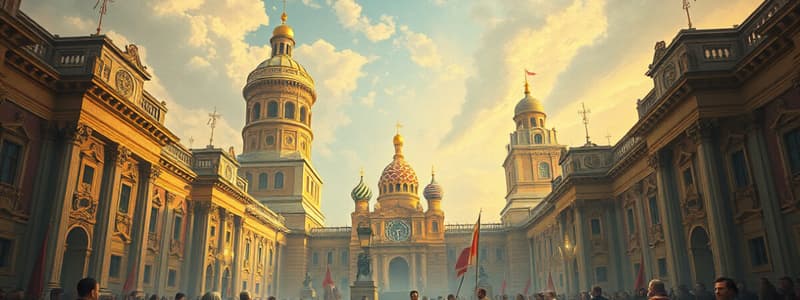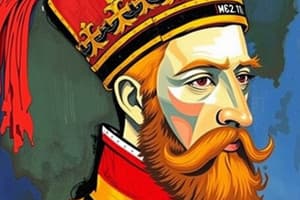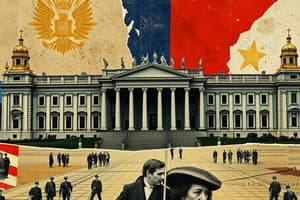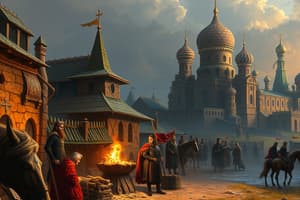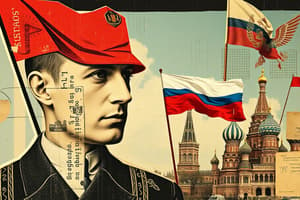Podcast
Questions and Answers
What percentage of Russia's population did peasants make up during Alexander II's reign?
What percentage of Russia's population did peasants make up during Alexander II's reign?
- 80% (correct)
- 65%
- 90%
- 50%
What was the primary concern of the peasants during Alexander II's reign?
What was the primary concern of the peasants during Alexander II's reign?
- Growing enough food (correct)
- Mobilizing against the Tsar
- Securing land ownership
- Reforming government policies
How many peasant uprisings occurred shortly after the emancipation?
How many peasant uprisings occurred shortly after the emancipation?
- 647 (correct)
- 320
- 499
- 850
Why was opposition from peasants considered relatively limited?
Why was opposition from peasants considered relatively limited?
What trend was observed in peasant opposition following their emancipation?
What trend was observed in peasant opposition following their emancipation?
What is one of the criteria that can be used to judge the effectiveness of opposition?
What is one of the criteria that can be used to judge the effectiveness of opposition?
What major uprisings associated with the Russian Revolution did not occur until after Alexander II's reign?
What major uprisings associated with the Russian Revolution did not occur until after Alexander II's reign?
What characterizes the nature of peasant revolts recorded shortly after their emancipation?
What characterizes the nature of peasant revolts recorded shortly after their emancipation?
What was a common agreement among the major thinkers of the Russian intelligentsia during Alexander II's reign?
What was a common agreement among the major thinkers of the Russian intelligentsia during Alexander II's reign?
How were the Populists influenced by Alexander Herzen's ideas?
How were the Populists influenced by Alexander Herzen's ideas?
What was the primary outcome of the Populists' attempts to reach the peasants in 1874 and 1876?
What was the primary outcome of the Populists' attempts to reach the peasants in 1874 and 1876?
What characterized the shift in strategy within opposition groups following the formation of Land and Liberty?
What characterized the shift in strategy within opposition groups following the formation of Land and Liberty?
What was the estimated number of members in the Land and Liberty group?
What was the estimated number of members in the Land and Liberty group?
Which group was directly influenced by the failures of the Populists?
Which group was directly influenced by the failures of the Populists?
What notable event happened during the trials of the Populists that impacted public perception?
What notable event happened during the trials of the Populists that impacted public perception?
What significant action did Vera Zasulich take that reflected a change in tactics by the opposition?
What significant action did Vera Zasulich take that reflected a change in tactics by the opposition?
Which group is associated with the ideology rooted in the mir and socialism, primarily influencing the Populists?
Which group is associated with the ideology rooted in the mir and socialism, primarily influencing the Populists?
How did the opposition of the intelligentsia influence the future of Russian political movements?
How did the opposition of the intelligentsia influence the future of Russian political movements?
Which statement accurately reflects the effectiveness of the intelligentsia's opposition during Alexander II's reign?
Which statement accurately reflects the effectiveness of the intelligentsia's opposition during Alexander II's reign?
What was a key belief of the Populists regarding the peasantry in Russia?
What was a key belief of the Populists regarding the peasantry in Russia?
What was the outcome for the Populists after their attempts to engage with the peasants?
What was the outcome for the Populists after their attempts to engage with the peasants?
What was one of Alexander II's major concerns at the beginning of his reign?
What was one of Alexander II's major concerns at the beginning of his reign?
What was a significant result of peasant opposition during Alexander II's reign?
What was a significant result of peasant opposition during Alexander II's reign?
What was the condition of the nobility by Alexander II's ascension in 1855?
What was the condition of the nobility by Alexander II's ascension in 1855?
How did the Zemstva impact local governance after their creation?
How did the Zemstva impact local governance after their creation?
What was the response of Alexander II to the St Petersburg Zemstva's demands in 1865?
What was the response of Alexander II to the St Petersburg Zemstva's demands in 1865?
What was the ultimate outcome of noble opposition during the reign of Alexander II?
What was the ultimate outcome of noble opposition during the reign of Alexander II?
What role did the intelligentsia play in opposition to Alexander II?
What role did the intelligentsia play in opposition to Alexander II?
Which body is mentioned as having minimal direct success in their opposition during Alexander II's reign?
Which body is mentioned as having minimal direct success in their opposition during Alexander II's reign?
What was a long-term effect of the reforms initiated by Alexander II after serf emancipation?
What was a long-term effect of the reforms initiated by Alexander II after serf emancipation?
What action did Alexander II take in response to multiple assassination attempts in the later part of the 1870s?
What action did Alexander II take in response to multiple assassination attempts in the later part of the 1870s?
What key influence did the nobility have during Alexander II’s reign despite their reduced power?
What key influence did the nobility have during Alexander II’s reign despite their reduced power?
What was a defining characteristic of the intelligentsia during Alexander II's reign?
What was a defining characteristic of the intelligentsia during Alexander II's reign?
Which group attempted to gain influence through discussions concerning constitutional reform in 1878?
Which group attempted to gain influence through discussions concerning constitutional reform in 1878?
How did Alexander II's approach to reforms ultimately affect the Zemstva?
How did Alexander II's approach to reforms ultimately affect the Zemstva?
What was a significant outcome of the attempts on Alexander II's life?
What was a significant outcome of the attempts on Alexander II's life?
Which group favored peaceful means and focused on principles put forward by Herzen?
Which group favored peaceful means and focused on principles put forward by Herzen?
How did the general public respond to the actions of the Land and Liberty group?
How did the general public respond to the actions of the Land and Liberty group?
What was the fate of the Black Partition Group during Alexander II’s reign?
What was the fate of the Black Partition Group during Alexander II’s reign?
Which statement best describes the People’s Will's approach to opposing the tsar?
Which statement best describes the People’s Will's approach to opposing the tsar?
What was the final outcome associated with the assassination carried out by the People’s Will?
What was the final outcome associated with the assassination carried out by the People’s Will?
Which factor would indicate that opposition during Alexander II's rule was limited?
Which factor would indicate that opposition during Alexander II's rule was limited?
What was a key characteristic of the peasants' opposition during Alexander II's reign?
What was a key characteristic of the peasants' opposition during Alexander II's reign?
Which group succeeded in assassinating Alexander II?
Which group succeeded in assassinating Alexander II?
What was the reaction of the tsarist state to the opposition movements?
What was the reaction of the tsarist state to the opposition movements?
What ultimately happened to the efforts of the intelligentsia opposed to Alexander II?
What ultimately happened to the efforts of the intelligentsia opposed to Alexander II?
What was the impact of the Loris-Melikov reforms after the assassination of Alexander II?
What was the impact of the Loris-Melikov reforms after the assassination of Alexander II?
How many members did the People’s Will approximately consist of?
How many members did the People’s Will approximately consist of?
What was the main tactic of the People’s Will after the split from the Land and Liberty movement?
What was the main tactic of the People’s Will after the split from the Land and Liberty movement?
Flashcards are hidden until you start studying
Study Notes
Extent and Effectiveness of Opposition During Alexander II's Reign
- Opposition during Alexander II's time can be categorized based on various social groups: Peasants, Nobility, Zemstva, Intelligentsia, Populists, Land and Liberty, People's Will, and Black Partition Group.
Peasants
- Peasants constituted around 80% of Russia's population.
- Significant uprisings occurred post-emancipation, with around 647 noted incidents, but these declined over time until the 1905 Revolution.
- Peasant revolts typically focused on local grievances rather than attacking Tsarism directly.
- Emancipation of the serfs was partially driven by peasant opposition, indicating some effectiveness, as well as subsequent reforms that benefited them.
- Despite improvements, peasant opposition remained subdued throughout Alexander II's reign.
Nobility
- By 1855, the nobility had weakened significantly due to previous Tsarist policies.
- Their opposition relied more on influence rather than violent resistance, marked by a reduced power base.
- Attempts at influencing the tsar during emancipation were largely ineffective; though they received compensation, their power diminished further.
- Overall, noble opposition failed to regain previous authority or influence effectively.
Zemstva
- Created in 1864, the Zemstva aimed at modernizing local governance post-emancipation.
- They served as effective local administrators but were largely dominated by the nobility.
- Instances of opposition occurred in the late 1860s and in 1878, but achieved little direct change.
- While they initiated discussions for constitutional reforms, no substantial transformation took place during Alexander II's era, leaving their effectiveness limited.
Intelligentsia
- A small and divided group, the intelligentsia consisted of middle-class thinkers with limited direct influence on immediate reforms under Alexander II.
- Key figures included Michael Bakunin, Alexander Herzen, Chernyshevsky, and Aksakov, each advocating different ideas for Russia's future.
- Their influence laid the groundwork for future opposition groups but failed to drive significant changes during Alexander II’s reign.
Populists (Narodniks)
- A small faction aiming for radical change, heavily influenced by Herzen's ideas centered on the peasantry.
- Failed to gain traction with the peasant population during attempts to incite revolution in 1874 and 1876, resulting in mass arrests.
- Although their trials garnered public attention and sympathy, they ultimately did not achieve significant political change.
Land and Liberty
- Emerged as a splinter group from the Populists with approximately 200 members.
- Engaged in more violent methods of opposition, including high-profile assassinations, but did not generate substantial change in governance.
- Despite some public support during trials, their actions ultimately led to increased repression rather than reform.
People’s Will and Black Partition Group
- The People’s Will, composed of around 500 members, favored violent direct action, leading to the assassination of Alexander II.
- The Black Partition Group focused on peaceful means but had negligible impact and faced severe repression.
- While the assassination of Alexander II can be seen as a success for the People’s Will, it did not lead to significant changes in the political structure, only more oppressive measures under Alexander III.
Conclusion
- Opposition activities during Alexander II's reign exhibited varied extent and effectiveness, with groups largely consisting of small, educated factions.
- No group achieved their overarching goals, and the autocratic governance continued unaltered.
- While the assassination of Alexander II is notable, it did not culminate in transformative political reform, underscoring the limited effectiveness of all opposition efforts.
Studying That Suits You
Use AI to generate personalized quizzes and flashcards to suit your learning preferences.
